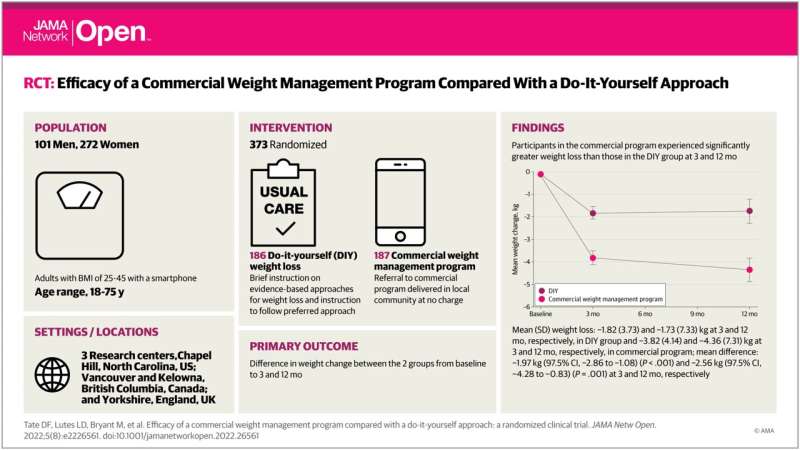
For people trying to improve their health and lose weight by themselves—privately tracking and journaling meals and exercise—new research from UBC Okanagan suggests it is time to call in the professionals.
Dr. Lesley Lutes’ latest research paper, published this month in the JAMA Network Open, suggests people trying to make lifestyle changes are more successful when they use a commercial weight loss program compared to those trying to do it on their own. She is the Director of UBC’s Centre for Obesity and Well-Being Research Excellence and studies behavioral change programs aimed at improving physical and emotional health and personal happiness.
“Given the prevalence of obesity, accessible and effective treatment options are needed to manage obesity and its comorbid conditions including heart disease and pre-diabetes,” she says. “Evidence-based commercial weight management programs are a potential solution to the lack of available treatment and considerably cheaper than a clinic-based approach.”
But, she notes, very few commercial programs have been rigorously evaluated, making it difficult for doctors to refer patients to for-profit programs due to a lack of evidence-based success rates.
While there are hundreds of commercial weight loss programs available—only six meet the United States Preventive Services Taskforce criteria—the quality and success rate, along with behavioral and nutritional components, isn’t well known by health-care providers.
Even fewer of these programs integrate cognitive, affective and behavioral factors—seen as critical elements of care and supported as the basic standard of any care.
As a result, she says, doctors are reluctant to refer patients to commercial programs.
The Canadian Medical Association clinical practice guidelines released in 2020 state that obesity care should be based on evidence-based principles of chronic disease management and must validate patients lived experiences.
“Essentially, obesity care needs to move beyond the simplistic approaches of ‘eat less, move more,'” she says. “To be successful it must address the root drivers of obesity.”
Dr. Lutes was one of the lead investigators who conducted a year-long study in Canada, the United States and the United Kingdom. More than 370 participants were randomly assigned into two groups—half to a commercial weight management program and the remaining to a do-it-yourself (DIY) group.
The DIY participants were provided with common weight-loss approaches—including strategies, diet tracking, self-monitoring apps, meal plans and physical activity—then essentially left to their own devices.
Those in the commercial program were encouraged to attend weekly workshops that included a private weight assessment and discussed successes, problem-solving and topics related to weight loss and behavior change. Participants also had access to an app, which included minimal self-monitoring of intake, activity and weight along with articles, around-the-clock support and an online community.
“One of the features of the commercial program used in this study was that self-monitoring was simplified to be less burdensome,” Dr. Lutes says. “Participants did not need to weigh, measure or track more than 200 foods, simplifying the process as much as possible.”
At three and 12 months, participants in both groups were assessed. Those randomized to the commercial weight management program lost more than twice as much weight and reduced their waist circumference by a greater percentage compared to those in the DIY group.
There were also secondary benefits for both groups including improvements in blood pressure, heart rate, aerobic stamina, flexibility and sleep.
Dr. Lutes emphasizes two key takeaways. First, the researchers determined adults assigned to a globally available commercial weight management program had greater success at three months. And, importantly, they felt supported and were able to maintain and continue that weight loss across 12 months. Those using the DIY approach had fewer successes.
She also notes this research provides a tool for care providers and policy-makers who see obesity as a serious health concern.
“This information can help me advocate the government about one of the many ways they can support patients in our province to improve health and well-being,” she says. “Perhaps our leaders can think about subsidizing access to commercial weight-loss programs that are proven effective. It could be a major step in helping achieve desperately needed improved health outcomes.”
Deborah F. Tate et al, Efficacy of a Commercial Weight Management Program Compared With a Do-It-Yourself Approach, JAMA Network Open (2022). DOI: 10.1001/jamanetworkopen.2022.26561
Citation:
Research proves it’s worth the money to pay for a weight loss program (2022, September 1)
retrieved 1 September 2022
from https://medicalxpress.com/news/2022-09-worth-money-weight-loss.html
This document is subject to copyright. Apart from any fair dealing for the purpose of private study or research, no
part may be reproduced without the written permission. The content is provided for information purposes only.


